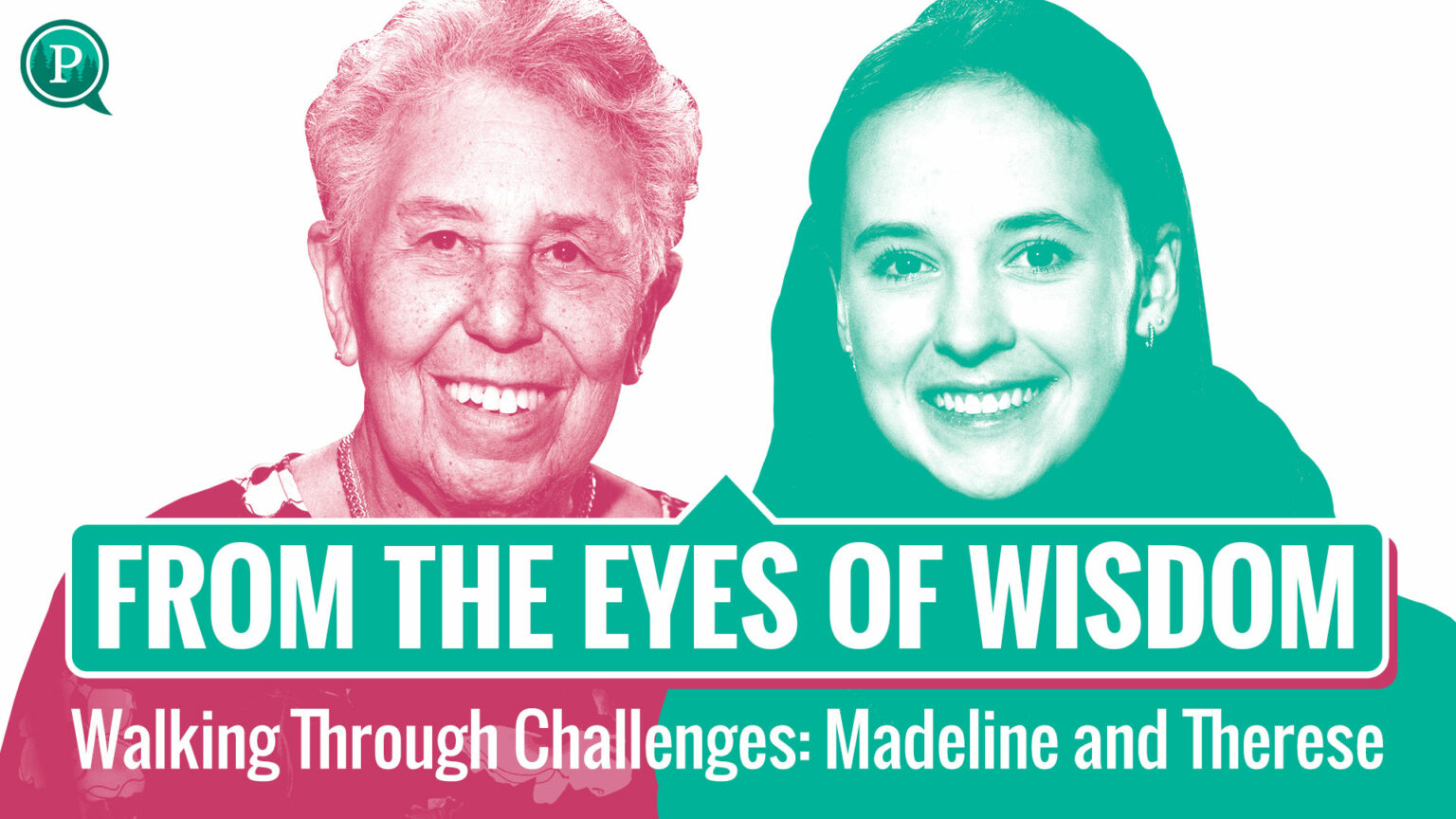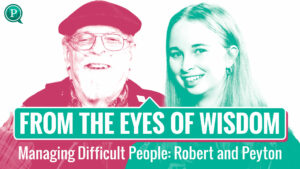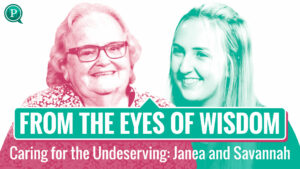In this episode host Sherri interviews Madeline, a retired military nurse, and Therese, a high school student interested in becoming a military nurse. Madeline shares her experiences of working in various nursing roles in the military, including in intensive care units, pediatrics, and operating rooms. She also discusses her time as a nurse recruiter and the importance of being flexible and adaptable in the nursing profession. Therese asks Madeline about the challenges of working in pediatrics and the possibility of becoming a flight nurse. Madeline advises Therese to be open to different opportunities, work hard, and take advantage of the experiences and cultures in different locations.
Find Out More:
CRISTA Senior Living | King’s Schools | CRISTA Media | CRISTA Ministries
Transcription:
Sherri:
Have you ever wished you could know what the future held before you got there? What if you were given the gift of knowledge before you even began your journey? Now I’ve been thinking about that because I made a lot of stupid mistakes when I was younger, and I wish I had someone to say, “Don’t go down that road. Go down this one.”
I’m Sherri, and welcome to “From the Eyes of Wisdom,” where we are pairing an experienced elder from CRISTA Senior Living with a passionate Kings High School student, ready to launch into the world. And while these conversations won’t tell the future exactly, they did reveal a lot we weren’t expecting about how to live life well. Are you ready? I can’t wait for you to hear this.
Welcome to “From the Eyes of Wisdom,” another wonderful episode. Today, joining us, we have Madeline. Thank you for joining us.
Madeline:
Thank you.
Sherri:
And then, Therese. Is it Therese?
Therese:
Yes.
Sherri:
Am I saying it right? Okay. Therese is here as well. You want to be a nurse, Therese?
Therese:
Yes.
Sherri:
Okay. In the military? Possibly. And then, Madeline, you were a nurse?
Madeline:
Yes.
Sherri:
In the military?
Madeline:
Yes.
Sherri:
Okay. So, you’re going to have a ton of wisdom to give to Therese, and hopefully, she won’t walk away today like, “Oh, never mind.” You’ll feel empowered. You’re going to get some wisdom. It’s going to be great. Okay. First, let me ask you, why nursing?
Therese:
Just the idea of the whole helping people. And I’ve always wanted to be in the military because I’ve seen my siblings in the military. And I just think nursing would just be the coolest way to be in the military.
Sherri:
Okay. And then, was it the coolest way to be in the military, Madeline?
Madeline:
It was.
Sherri:
Was it? So, she’s right with that.
Madeline:
She’s very right. I spent 31 years at it.
Sherri:
31 years.
Madeline:
I did enjoy it.
Sherri:
Okay. And so, why nursing for you?
Madeline:
Actually, when I was quite young, I heard an ad that said that the Navy needed nurses. And to me, it sounded like it said, “Madeline, the Navy needs you to be a nurse so that you can join the Navy.” So, I became a nurse so I could join the Navy.
Sherri:
So, it was advertisement, and it sounded like it was speaking directly to you.
Madeline:
That’s right.
Sherri:
Nursing is God’s work. I cannot articulate the heart of a nurse. I don’t understand it. I don’t think it’s celebrated enough. You’ve had to see so many things. You had to have seen a lot of pain, and a lot of sickness, and a lot of… How do you do it every day? How do you say, “Okay, I’m okay to do it the next day”?
Madeline:
I guess it’s because you have the feeling that you’re helping, and that because of you, they will go beyond that. So, you have hope that your helping is going to alleviate some of the pain, or the discomfort, or at least help them live with it. You can’t always get rid of what’s there, but you can always help them to live with it and to accept it as what God has given them, I guess.
Sherri:
Right. Well, I love the word “hope.” Did you have hope to say, “Okay, I can help someone get through the next day”? Have you ever thought about that, Therese, where you’re like, “I’m going to see some stuff if I’m a nurse”?
Therese:
Yeah, a little bit.
Sherri:
Okay. Have you ever shadowed anyone or seen anyone do nursing?
Therese:
No, I have not.
Sherri:
No. Okay. So, you just decided like, “I want to help people.” You haven’t seen anyone do it, it wasn’t like, “Hey, I had an aunt that was a nurse and then they made…” You just felt like this is something I wanted to do.
Therese:
Well, one of my sister’s friends, she’s a nurse in the military, and she’s really close with my sister. And just seeing how strong she is, it’s just crazy. She’s like, “Yeah, my schedule.” It was like she had all night shifts, but she didn’t seem tired or anything. She just wanted to keep doing it. And I thought that was just crazy.
Sherri:
Just her stamina?
Therese:
Yeah.
Sherri:
Okay. All right. So, Madeline, tell me about you get your nursing degree first before you go into the military. Is that how it went?
Madeline:
I went through a three-year nursing program, so I did not have a degree. After I graduated from nursing school, I worked for two years waiting for some friends who were going to join the Navy with me.
Sherri:
Okay. Did you have a specific area of nursing you wanted to go into?
Madeline:
I wanted to go into pediatrics.
Sherri:
Okay. And that’s what you want, Therese, right?
Therese:
Yeah.
Sherri:
Okay.
Madeline:
So, when I started working at the hospital, they also hired other people to work in pediatrics. The difference was that I graduated from that nursing school, and it was one of the first hospitals that had intensive care units in it, west of the Mississippi. So, because I was trained in the intensive care unit, every time they were short, I got moved to the intensive care unit. And that happened over and over again.
So, I finally said, “If you need me there, put me there, I will move there.” And so, I worked in the intensive care unit. It’s very different than working in pediatrics. You feel so sorry for the little kids. It hurts to give them shots and things like that, even though you know they have to get it. But, of course, in the intensive care unit, you’re really dealing with life and death a lot more every day.
Sherri:
It sounds like the first lesson was, be flexible. You think you’re going to be in pediatrics-
Madeline:
That’s right.
Sherri:
… but you were actually going to be over here in ICU.
Madeline:
Yes.
Sherri:
What was the first time you saw something that you were like, “Whoa”?
Madeline:
It actually happened, I think, when I was a student, not when I was actually already a nurse. A policeman was injured on his motorcycle. He fell off of it, and the motorcycle started twisted around him. And I couldn’t believe that that motorcycle could do that much damage to him.
Sherri:
Okay. To him?
Madeline:
To him.
Sherri:
So, you were a student?
Madeline:
Uh-huh.
Sherri:
So, were you working in the hospital as a…?
Madeline:
It’s part of the training, you work in a hospital.
Sherri:
I mean, I don’t want to cringe here. You don’t get sick to your stomach?
Madeline:
Nope. And what’s really funny, I really don’t like hospitals. I like to work in the hospital. I do not like to visit people in the hospital. It’s a big difference, visiting is one thing, working in it is entirely different. I belong in it when I’m working, when I visit, I don’t belong in it.
Sherri:
Okay. I was going to say, because I think a hospital is pretty important in nursing, but then I can’t… All right, so you’re working in a hospital, you think you’re going to do pediatrics, end up ICU. A lot of ICU work. You are waiting for your friends to join the Navy with you. How do you get to the Navy?
Madeline:
They all married Navy guys.
Sherri:
Okay, all right.
Madeline:
And I decided, well, it was time for me to do it. So, it was two years after I graduated, I joined the Navy.
Sherri:
You joined the Navy. And then you went where?
Madeline:
Newport, Rhode Island.
Sherri:
Okay.
Madeline:
And I went there. For the Navy, you get a direct commission, and because since I was already a nurse, I was commissioned as an ensign, and orientation for the Navy is in Newport. But I wanted to be as far away from Los Angeles as possible.
Sherri:
That was your home?
Madeline:
Los Angeles.
Sherri:
Los Angeles was your home.
Madeline:
So, I sort of looked on the map and saw how far away I could get, and Newport sound like a good place to go.
Sherri:
That’s pretty far from LA.
Madeline:
But it wasn’t as far as away as I could have gone further.
Sherri:
Okay. Now, what are your feelings about leaving home?
Therese:
I’m okay with it.
Sherri:
You are?
Therese:
Mm-hmm. I think traveling would be super cool.
Sherri:
Okay, so you feel good about leaving, but you’re not in a position where “I got to get as far away from here as I possibly can.”
Therese:
Yeah.
Sherri:
Okay.
Madeline:
But I wanted to see the world. I had never been to the East Coast. At least that far.
Sherri:
You wanted to explore?
Madeline:
I wanted to explore.
Sherri:
Okay, so you feel that too?
Therese:
Yes.
Madeline:
[inaudible 00:08:25].
Sherri:
Okay, good. So, you’re in Newport. How long were you there?
Madeline:
Two years.
Sherri:
Two years. Okay. And what are you doing there? What’s your…?
Madeline:
Well, let’s see, I started off in the intensive care unit again, but I also got to play in the nursery. So, I got there. It’s a small hospital. So, you really went to more than just one area. Worked in more than one area. Even though primarily, I worked in the intensive care unit, which what was also the recovery room. But I also rotated into the nursery, which I loved working in.
Sherri:
What’s happening in intensive care there? Because this is a Navy base. So, are these people just having general health issues? I mean, it’s not combat.
Madeline:
Heart attacks, infections like meningitis.
Sherri:
Okay. So, like a normal hospital?
Madeline:
A normal hospital. As I said, it was recovery rooms. So, people who’ve had surgery, I would take care of them. We’ve occasionally had some strange things. Like one time, a group of sailors got locked in a compartment that they were painting, and they wound up being intoxicated from the paint, over intoxicated. In fact, they were unconscious when they finally found them.
Sherri:
From the paint?
Madeline:
From the paint. It’s toxic, the paint is toxic. And they were in enclosed units. So, I got all of these fellows into the intensive care unit. By this time, they had gotten air and oxygen, so they were now awake, but they were pretty drunk off of the fumes. And they were covered in gray paint.
Sherri:
So, you had a group of guys that had painted themselves gray because they were intoxicated from paint.
Madeline:
Yeah.
Sherri:
That’s what you were doing in the Navy.
Madeline:
That was one of the funniest things I’ve done in the Navy.
Sherri:
Okay. So that’s Newport. You’re there for, did you say two years?
Madeline:
Two years.
Sherri:
And then, where do you go?
Madeline:
I went to Japan.
Sherri:
When you get the orders to go to Japan, are you like, “What?” or you’re like, “Yeah”?
Madeline:
No, I planned on it.
Sherri:
You planned on it?
Madeline:
I planned on it. I joined the Navy. I was going to go somewhere.
Sherri:
Okay.
Madeline:
And I loved it.
Sherri:
You loved it?
Madeline:
Mm-hmm.
Sherri:
Okay. So, you’re exploring. Therese, do you have any questions about exploring? Because this sounds like Madeline’s an explorer at heart. You’re okay getting out there? There’s no fear, you just want to do it, want to see it, want to check it out, whatever it is. Any questions about that?
Therese:
Did you ever think of… Because I’ve heard of nurses in planes for the Air force. Did you ever think of doing that? Being a traveling nurse?
Madeline:
Uh-uh.
Sherri:
Not you thing?
Madeline:
No. Well, that was not my plan of things to do. We became much more when the Air Force became part of the military, they had flight nurses. And most flight nurses were Air Force. The Navy has flight nurses also now, but not a lot because usually they just give it to the Air Force to take care of that type of thing. But because of some of the duty stations that we have, if somebody has to be evacuated, they need a nurse to go with them. So, in those particular places, there may be a flight nurse there. So yes, they do have navy nurses who are flight nurses also.
Sherri:
Is that something you think you’d be interested in?
Therese:
Yeah, I think that would be pretty cool.
Sherri:
Really?
Therese:
Mm-hmm.
Sherri:
Now, if I’m understanding it, correct me if I’m wrong, if you’re in that position, that’s more of a closer combat kind of scenario, or no?
Madeline:
Not necessarily.
Sherri:
Okay. Where were you flying them?
Madeline:
Overseas. Or from one location to another. We have a lot of bases in Europe and Asia, and they need to come back to the US for care.
Sherri:
Oh, I see.
Madeline:
So, they put them on transport.
Sherri:
Okay. And you needed a nurse there?
Madeline:
And they needed a nurse.
Sherri:
All right, so you’re in Japan, and you’re there how long?
Madeline:
20 months.
Sherri:
20 months. Okay. And you’re just working in ICU?
Madeline:
I worked in the nursery.
Sherri:
Did you finally got your pediatrics?
Madeline:
I worked in the nursery, yes.
Sherri:
All right, so playing with the kids. And wait a minute, is this where there was a fire, or?
Madeline:
Yes, there was a fire.
Sherri:
Okay, I remember. Tell me that story.
Madeline:
The fire wasn’t at the hospital. There was a theater behind the hospital and the theater caught on fire, and it’s right behind the hospital. It was near the operating room where they store all of their oxygen. So, they decided to evacuate a good percentage of the hospital, including the nursery. And so, I had to get all of the babies out.
A large percentage of the babies went with their mothers. There were some infants who were without their mothers, and many of the nurses who were off duty came down to see if I needed help. So, I gave them all a baby, and sent them over to some housing area that was right across from me. And then I took the one baby that was on oxygen in an incubator. We were the last three with one of the corpsmen. The three of us left at the same time.
Sherri:
I have to say, and I’m going to ask you, Therese, about this. I’m amazed at the ease with which you tell that story. I’m guessing just because of your job, you’re not a panicky person. The thing has to get done. We’ll do the thing, right? I guess that’s part of the temperament needed for nursing. Do you feel like you have that kind of temperament where it’s not anxious or panicky?
Therese:
I don’t know. Sometimes I get a little panicked.
Sherri:
How would you describe your temperament? Are you a person that’ll panic easy, or you’re calm, or how would you describe your own temperament?
Therese:
I feel like I’m calm, but then some things do stress me out a little bit. But my anatomy teacher was saying that one of her students will become a doctor, but while they were watching the movie, she fainted because she saw blood, but later she become a doctor. So, she said you kind of just have to get used to it a little bit. So, I don’t know. Hopefully, that happens to me.
Madeline:
I guess it’s like not liking hospitals, but being a nurse in it, it’s two different things. Some people don’t like blood, but they can do a really… It is normally, but they can deal with it in their job.
Sherri:
Oh, okay.
Madeline:
It’s part of their job, not in their life.
Sherri:
Okay. So, you can watch the anatomy thing and be like, “Oh my God, blood,” and pass out. But then if you have to draw blood, it’s like, “Oh what? It’s my job. So, whatever.” I’m thinking of myself, not that I’m a panicky person, but if someone’s like, “There’s a fire behind us, the oxygen’s here, we got to get the babies out.” I would never tell the story, like “Okay, well, let’s get the babies.” So, I think that’s a nursery thing. Every nurse I know has that kind of calm demeanor of “Let’s do the next thing.” I’m guessing that would be a piece of wisdom that you would give her. Am I right?
Madeline:
Yeah, I guess so.
Sherri:
Okay.
Madeline:
And I guess it’s something that you sort of grow into.
Sherri:
You develop it.
Madeline:
You develop it as part of the nursing education type of thing, and how you deal with unexpected events, because they’re always unexpected events.
Sherri:
Okay, 20 months in Japan, that’s done. You’re working in pediatrics. That’s what you wanted to do. And then, what happens after that? Because you’re still in the Navy at this point?
Madeline:
I applied for school to go and get my bachelor’s degree, so I requested to come to the University of Washington to get my bachelor’s degree. So, I came to Seattle and went to school at the University of Washington.
Sherri:
Great. All right. So, you do that, and then, when that’s done, do you travel somewhere else?
Madeline:
I went to Oakland. To the Naval Hospital in Oakland, California.
Sherri:
Okay. And then, what were you doing there?
Madeline:
I worked in the operating room.
Sherri:
Wow. So, you really are just open to what’s the thing that’s coming in front of me now?
Madeline:
Yeah. Even though, as a student during the summer, I worked in an operating room. So, I was used to working in an operating room, and I enjoyed it.
Sherri:
You did?
Madeline:
Yeah.
Sherri:
Did you enjoy it more than pediatrics?
Madeline:
No.
Sherri:
No. Pediatrics was still your love.
Madeline:
I still loved the pediatrics.
Sherri:
Still loved pediatrics.
Madeline:
And I loved working in the nursery.
Sherri:
Okay. So, what did you love about the operating room? It’s a lot of blood, Madeline.
Madeline:
There’s a lot of blood.
Sherri:
It’s a lot of blood.
Madeline:
There’s a lot of blood.
Sherri:
It’s a lot.
Madeline:
Well, not always. So, not really.
Sherri:
No?
Madeline:
Not really, no. They have lots of things to stop people from bleeding. Don’t forget, they’re cauterized to stop the bleeding.
Sherri:
I went to a medical missions hospital to do just some… They come see the missions that we do, and they’re like, “Would you like to see one of the operate, go into the op, and I was like, “No.” And they’re like, “Are you sure? We could show you how we do the…” And I’m like, “No, I really, really desperately do not want to see that,” because I just thought it would just be blood, and…
Madeline:
No, it’s not really. They don’t allow people to just bleed out.
Sherri:
That’s going to be the title of the podcast. “They don’t allow people to just bleed out.” All right.
Madeline:
They control the bleeding.
Sherri:
So you’re in the OR?
Madeline:
Yes.
Sherri:
And how long did you work in the OR?
Madeline:
Only a year.
Sherri:
Okay.
Madeline:
Then I went to Los Angeles, where I was in recruiting.
Sherri:
Okay, recruiting. So, now you’re not practicing, so to speak?
Madeline:
Nursing. I’m a nurse recruiter.
Sherri:
Oh, okay. Oh, this is exciting. All right. Therese is here. She’s ready to be a nurse for the Navy. What are you looking for, as a recruiter?
Madeline:
Well, let’s see. Somebody who’s interested, of course, in serving their country as well as humanity.
Sherri:
Okay. What kind of questions would you ask her?
Madeline:
I’d be interested in what you’re doing as far as your preparations going to nursing because you’re going to go to nursing school, you’re still in school. And what type of programs you’ve taken so that you’re ready to go into the nursing program. What are some of your interests, as far as, like you said, you want to be a flight nurse. I can tell you probably you would not get flight nursing in the Navy. If you want to do that, you’d probably go to the Air Force as opposed to the Navy.
Sherri:
Okay. What if she says “No, I want to be in the Navy.” Then you’d say, “Well, what are some of your interests?” And then what would you say?
Therese:
Well, I don’t know. I’ve always thought of being in the Air Force.
Sherri:
Okay. Oh, Air Force. Okay. All right. So, she’s like, “Goodbye,” and she walks on and slams the door.
Therese:
That’s not what I meant. My whole family is all in the Air Force.
Sherri:
Okay, so she’d want to be like a flight nurse. Okay.
Madeline:
Yes.
Sherri:
All right. Okay. So, still same kind of interview.
Madeline:
Yeah, the same thing,
Sherri:
Same kind of concept.
Madeline:
[inaudible 00:20:14]. Have you taken sciences? And those types of things. Because you really do need sciences to go into the nursing programs these days. Probably foreign language as well. Mainly just some of the college programs require that of you before you can go in. And they don’t have three-year programs like I went anymore. You need to have a baccalaureate degree to come in. So, there are associate degree programs, but as far as I know, none of the services accept associate degree nurses. You have to have a baccalaureate degree. I would suggest if you’re interested in military, join the NRLTC, or not the NRLTC. Well, I could say NRLTC, but that’s a Navy Reserve Officer Corps. Or go into ROTC. And there’s Air Force, and they pay for part of your education, which is the way to go.
Sherri:
Did you know that? You were interested in that?
Therese:
I do. Yeah.
Sherri:
Yeah.
Madeline:
And I really wouldn’t suggest that you apply for it.
Therese:
So, you paid for your nursing school yourself, and then joined the military?
Madeline:
That’s right. I paid for my three years. I became a nurse on my own dollar. When I got my bachelor’s, the Navy paid for it. And I was already a lieutenant, so I got lieutenants’ pay. And they paid for my tuition, and part of my books, and things like that. So, it was a great way to go to school.
Therese:
Yeah, that’s what I’ve heard. A lot of the schools that I’d want to go to, like ROTC would be the way, because so expensive otherwise.
Madeline:
Yeah. And you just have a commitment afterwards.
Therese:
Exactly, yeah.
Madeline:
So, you have to join. You have to join the military. You have to go active duty afterwards.
Sherri:
How long? Do you know?
Therese:
I know it’s four years if you’re just a normal job, but if you go to med school, it’s like 10 years.
Madeline:
Yes.
Sherri:
How do you feel about that?
Therese:
That’s a lot.
Sherri:
Okay.
Madeline:
It goes by very fast.
Therese:
That’s true. My parents were saying you’d be trying to find a job. Usually a lower job for four years anyway, so why not? If it is getting paid for. I don’t know, getting a job right out of college would be nice, especially in the military. So, I’d be fine with it.
Sherri:
Let me ask you something, Madeline. Do you look back? You really ended up kind of expanding and doing more, not just nursing, and being on the floor and all that. You’re recruiting. And then, I think at some point, you end up in Hawaii, right?
Madeline:
Mm-hmm.
Sherri:
And just doing so many different various roles. Do you have any regrets or are you like, “You know what? I’m really glad I just kept my life open to all of those different things.” Can you give Therese some wisdom in that, and saying, “Look, open your life up to those things”
Madeline:
We really have opened up our world, not just by the bedside. Looking at nursing as being much broader. There’s lots of people now in computers associated with healthcare. So, our world has expanded greatly, not just at the bedside. And I think one of the best things about the military is that they do prepare you for that. So, when you came out, you can do many things, other than just taking care of somebody at the bedside. And the world is sort of our oyster out there.
Sherri:
Yeah. Yeah.
Madeline:
And you do look at it and seeing all of the various things that you can do. Many people go into nurse practitioner programs. They really encourage you to keep your education going. So, getting your master’s degree in a particular area, or even PhD. And when I joined, the highest rank that a nurse could reach was captain, and there weren’t that many. Now, you can be an Admiral. We were basically nurses at the bedside. We did supervising of nurses or corpsmen in the hospital. Now we are CEOs of hospitals.
Sherri:
Wow. Can I ask you what, if you can think about it, maybe, as a nurse overall, what your hardest day was? Can you remember a day where you were like, “You know what, this was a hard day.” I don’t know. You may not have felt like quitting, but it was just a real hard nurse day.
Madeline:
You said hardest in a sense that I dread it.
Sherri:
Yeah.
Madeline:
Not necessarily something happening. When I was in Hawaii, I was commanding officer of the clinic there, and during that period of time, the Gulf War started. And none of my staff should have gone to Kuwait, but all of a sudden, because of some other things, some of my staff wound up by going. And I dreaded the fact that if anything happened, I would have to notify their family that they had been killed. Fortunately, they all came home safely, but that was probably my hardest moment, thinking, “Why did I ever take this job? I may have to tell somebody that their son or daughter has…” Son, they were all males, “that your son has died.” And that did not happen.
Sherri:
Yeah, I can imagine.
Madeline:
I was very thankful.
Sherri:
A lot of anxiety over thinking that.
Madeline:
Yeah.
Sherri:
Yeah. Now, I am going to give Therese a card. Take that and a pen. My favorite pen, you got to give it back. One piece of advice that she’s going to need through life. She’s going to take this when she’s 22, when she’s 32, when she’s 42, she’s got this one thing that Madeline told her that she’s going to have to remember. If you can have one piece of advice that she needs to know, what is it?
Madeline:
I think you mentioned it. I think one of the things that, as I said, I wanted to do, I had this one thing in mind, and-
Sherri:
Pediatric nurse.
Madeline:
Pediatrics. And for the most part, it never really came to fulfillment in the full sense of the word. But I had a wonderful career. And I loved it, mainly because I was always flexible. Somebody said to me, “I’m going to give you this job, I think you can do it.” So, I took the job and I did it as best I could. And I think every time, even if you get a job that you don’t want, or if you don’t think that this really fits you, do the best that you can in that job. And learn from it. Because you will glean little bits from that to apply to other jobs that you’re going to get. And I think that’s true. And I don’t think it’s true just in the military. I think that’s probably true just in life. There are lots of curve balls that are thrown to us, and we need to be able to be flexible enough to catch them and make the best out of them.
Sherri:
I love that. So, it’s like, “Okay, here’s a job you’re giving me. I don’t like it and I don’t think it fits me, but I’m going to do the very best I can at it, and believe that there’s some little thing that I can get out of it.”
Madeline:
Out of that, yeah.
Sherri:
Right. Until I move to the next thing. And ultimately, I mean, your life is a testament to it. I can glean enough things from all of these little things till I really put together a life well lived, right? Where you’re like, “Okay, all of these things kind of… I may not have liked this little thing, but I grabbed things from it. I was flexible.” And you look at the totality of it all, and it paints a really beautiful picture. I like that.
Therese:
Me too.
Sherri:
Yeah. Any other questions for Madeline?
Therese:
Where is the favorite place you travel, do you think?
Madeline:
One of the things I find is that sometimes the location is not necessarily the best. The people that are there, they make the vacation. I probably had more fun in Okinawa, Japan, than any other place, mainly because of the people that were there. And we had a grand time.
Sherri:
So, why do you have such a great time there?
Madeline:
It was just a good family. And everybody got along, we had fun. We took advantage of the culture, and we all benefited from it. We worked hard, but then we played hard, which took advantage of all of the things that were there. They had recreation places that you could go to. You could travel from there too. I went to China from there, so that was fun. And said, “We worked hard and we played hard.”
Sherri:
Yeah. I like that. You could write that down too.
Madeline:
Work hard and play hard.
Sherri:
Work hard. Yeah.
Therese:
I guess I have one more question. So, I want to go to pediatrics because mostly because I love kids and I work with kids. I’m a swim instructor. But some people say that it’s harder to see kids suffering than older people. So what would you say on that?
Madeline:
At times, you do, but then the fact that you’re helping them and their families really sort of makes it easier. Because you’re trying to help them recover. So, you’re looking at yourself as being a real helper for them, and not necessarily just looking at them suffering. And I guess you’d sort of take on some of their suffering a little bit with it too.
Sherri:
But I’m helping the sufferer.
Madeline:
But I’m helping them. I really am helping them. And keep looking at the fact that what I am doing is making it better for them. Or better for somebody who might follow on because of what you’re doing.
Therese:
Thank you.
Sherri:
That’s good. I hope you guys keep in touch as you continue to pursue this, that Madeline will maybe be able to help you on your journey because she has so much wisdom to give. Thank you, guys.
Madeline:
Thank you.
Therese:
Thank you.
Madeline:
You’re welcome.
Sherri:
Thank you, everyone, for listening to Through the Eyes of Wisdom. And we’ll see you. Or you’ll hear us because you can’t see us, unless you’re watching YouTube and you can see us, and we’ll wave. Everybody just wave somewhere, anywhere. Just like, okay.
Madeline:
Is this on YouTube?
Sherri:
I don’t know. We’ll see here. Whatever. Next time.
Follow this podcast:







